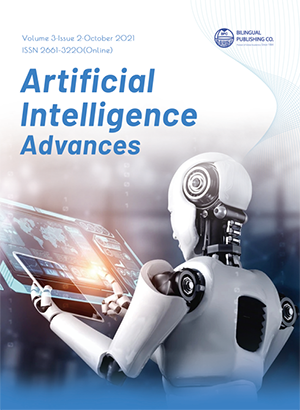-
1297
-
1261
-
1224
-
Human Being Emotion in Cognitive Intelligent Robotic Control Pt I: Quantum / Soft Computing Approach1165
-
1158
Quantum Algorithm of Imperfect KB Self-organization. Pt II: Robotic Control with Remote Knowledge Base Exchange
DOI:
https://doi.org/10.30564/aia.v3i2.3849Abstract
The technology of knowledge base remote design of the smart fuzzy controllers with the application of the "Soft / quantum computing optimizer" toolkit software developed. The possibility of the transmission and communication the knowledge base using remote connection to the control object considered. Transmission and communication of the fuzzy controller’s knowledge bases implemented through the remote connection with the control object in the online mode apply the Bluetooth or WiFi technologies. Remote transmission of knowledge bases allows designing many different built-in intelligent controllers to implement a variety of control strategies under conditions of uncertainty and risk. As examples, two different models of robots described (mobile manipulator and (“cart-pole” system) inverted pendulum). A comparison of the control quality between fuzzy controllers and quantum fuzzy controller in various control modes is presented. The ability to connect and work with a physical model of control object without using than mathematical model demonstrated. The implemented technology of knowledge base design sharing in a swarm of intelligent robots with quantum controllers. It allows to achieve the goal of control and to gain additional knowledge by creating a new quantum hidden information source based on the synergetic effect of combining knowledge. Development and implementation of intelligent robust controller’s prototype for the intelligent quantum control system of mega-science project NICA (at the first stage for the cooling system of superconducted magnets) is discussed. The results of the experiments demonstrate the possibility of the ensured achievement of the control goal of a group of robots using soft / quantum computing technologies in the design of knowledge bases of smart fuzzy controllers in quantum intelligent control systems. The developed software toolkit allows to design and setup complex ill-defined and weakly formalized technical systems on line.
Keywords:
Quantum software engineering, Quantum algorithm, Group of intelligent robots, Multi-agent system, Intelligent control, Fuzzy controller, Remote transmission of knowledge, Knowledge synergeticReferences
[1] Peres, R.S. et al. Industrial Artificial Intelligence in Industry 4.0 Systematic Review, Challenges and Outlook [J]. IEEE Access. / SPECIAL SECTION ON ADVANCED ARTIFICIAL INTELLIGENCE TECHNOLOGIES FOR SMART MANUFACTURING, 2020, 8: 220121 - 220139.
[2] Ulyanov, S. V. Quantum fast algorithm computational intelligence PT I: SW / HW smart toolkit [J]. Artificial Intelligence Advances, 2019, 1(1): 18-43. DOI:https://doi.org/10.30564/aia.v1i1.619.
[3] Ulyanov, S. V. Quantum Algorithm of Imperfect KB Self-organization Pt I: Smart Control-Information-Thermodynamic Bounds [J]. Artificial Intelligence Advances, 2021, 3(2): 13-36. DOI:https://doi.org/10.30564/aia.v3i2.3171.
[4] Huba, M., Vrancic, D. Comparing filtered PI, PID and PIDD2 control for the FOTD plants [P]. IFAC Papers On Line, 2018, 51(4): 954–959 [Available online at www.sciencedirect.com].
[5] Keramat, R. et al. A Comparison of Fuzzy and Brain Emotional Learning-Based Intelligent Control Approaches for a Full Bridge DC-DC Converter [J]. International Journal of Industrial Electronics, Control and Optimization, 2019, 2(3)6: 197-206.
[6] Vrancic, D., Huba, M. High-Order Filtered PID Controller Tuning Based on Magnitude Optimum [J]. Mathematics, 2021, 9: 1340.DOI:https://doi.org/10.3390/math9121340.
[7] Das, S. et al. Performance Analysis of Robust Stable PID Controllers Using Dominant Pole Placement for SOPTD Process Models [R]. arXiv: 1801.09238, 2018.
[8] Sahib, M.A. A novel optimal PID plus second order derivative controller for AVR system [J]. Intern. J. Eng. Sci. and Techn., 2015,18: 194-206 (http://creativecommons.org/licenses/by-nc-nd/3.0/).
[9] Zaidel, Y. et al. Neuromorphic NEF-Based Inverse Kinematics and PID Control [J]. Frontiers in Neurorobotics, 2021, 15(Article 631159) [www.frontiersin.org].
[10] Juniku, I., Marango, P. PID design with bio-inspired intelligent algorithms for high order systems [J]. INTERN. J. MATHEMATICS & COMP. IN SIMULATION, 2015, 9: 44-59.
[11] Agha, A. et. al. NeBula: Quest for Robotic Autonomy in Challenging Environments; TEAM CoSTAR at the DARPA Subterranean Challenge (preprint version) [R]. arXiv:2103.11470v1 [cs.RO] 21 Mar 2021.
[12] Hudson, N., et al. Heterogeneous Ground and Air Platforms, Homogeneous Sensing: Team CSIRO Data 61’s Approach to the DARPA Subterranean Challenge [R]. arXiv:2104.09053v1 [cs.RO] 19 Apr 2021.
[13] Jagatheesaperumal, S.K. et. al. The Duo of Artificial Intelligence and Big Data for Industry 4.0: Review of Applications, Techniques, Challenges, and Future Research Directions [R]. arXiv:2104.02425v1 [cs. AI] 6 Apr 2021.
[14] World Robotics 2016 Service Robots. International Federation of Robotics (IFR) [R]. 2016.
[15] CORBYS Cognitive Control Framework for Robotic Systems (FP7 – 270219). Deliverable D2.1 Requirements and Specification [R]. 2011.
[16] Yang, G.-Z. The grand challenges of Science Robotics [J]. Sci. Robotics, 2018, 3: 7650.
[17] Sniderman, B. еt al. Industry 4.0 and manufacturing ecosystems [M]. Deloitte’s Univ. Press, 2020.
[18] White Paper: AI in Industrial Automation [R]. German Electrical and Electronic Manufacturers’ Association, 2021.
[19] Ulyanov, S.V. Self-organizing quantum robust control methods and systems for situations with uncertainty and risk [P]. Patent US 8788450 B2, 2014.
[20] Ulyanov, S. V. Self-organized robust intelligent control [M]. Saarbrücken: LAP Lambert Academic Publishing, 2015.
[21] Ulyanov, S.V. Quantum relativistic informatics [M]. LAP LAMBERT Academic Publishing, OmniScriptum GmbH & Co. KG, 2015.
[22] Ulyanov, S.V. System and method for control using quantum soft computing [P]. Patent, US 6,578,018, B1, 2003.
[23] Litvintseva, L. V., Ulyanov, S. V. Intelligent Control Systems. I. Quantum Computing and Self-Organization Algorithm [J]. Journal of Computer and Systems Sciences International, 2009. 48. (6): 946 - 984. DOI: https://doi.org/10.1134/S1064230709060112.
Downloads
How to Cite
Issue
Article Type
License
Copyright © 2021 Author(s)

This is an open access article under the Creative Commons Attribution-NonCommercial 4.0 International (CC BY-NC 4.0) License.




 A.G. Reshetnikov
A.G. Reshetnikov





